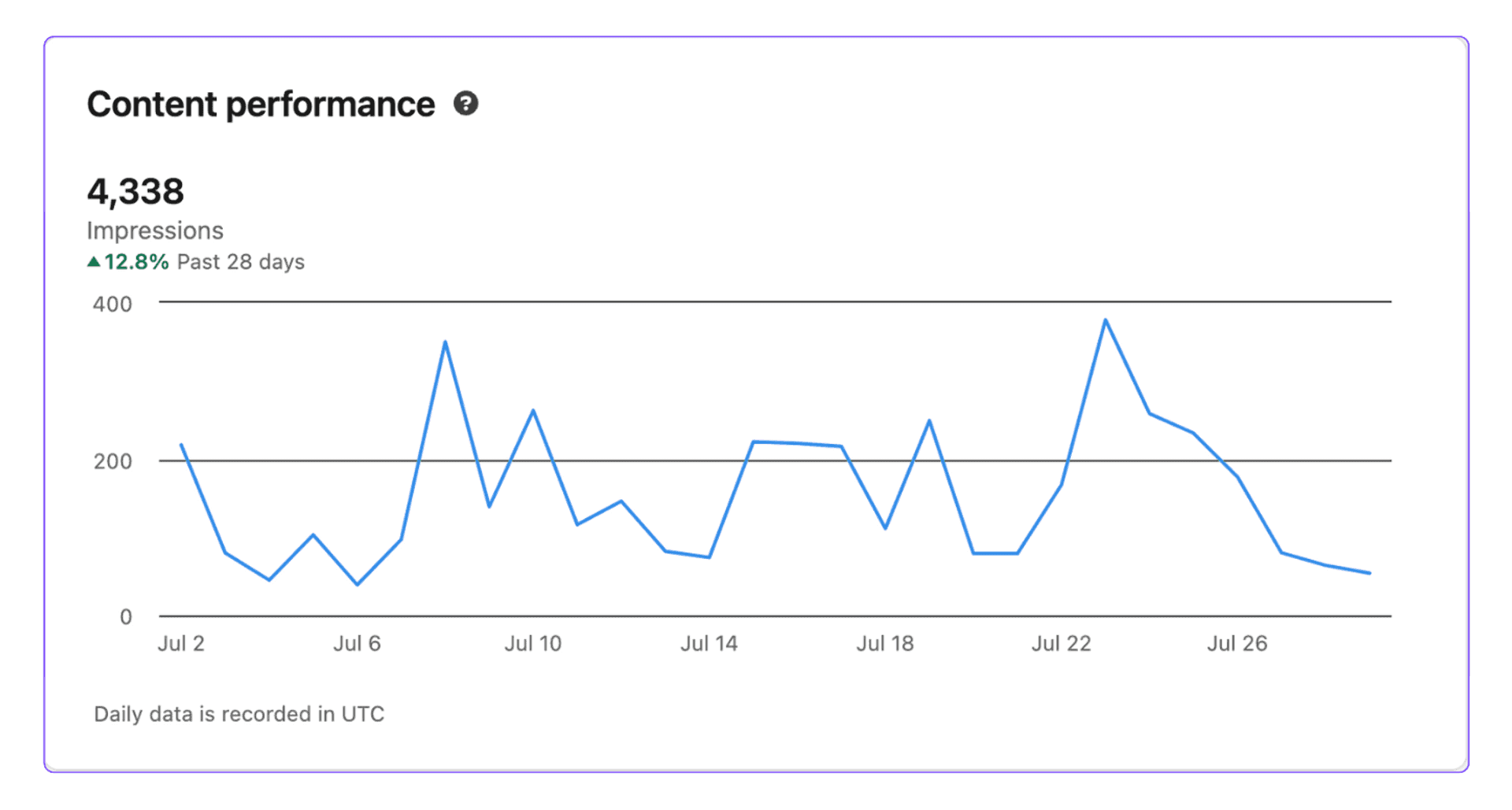Content Creation

Esteban Puttner
Last updated: Feb 6, 2026
If you’re here, you’re definitely wondering what on earth LinkedIn Post Impressions are and how to increase them.
Whether you’re an entrepreneur, creative, emerging professional, or someone looking to expand your network, this guide will help you improve your LinkedIn impressions with ease and confidence (and if you need a refresher, check out the basics of impressions first).
Take a deep breath, grab a notebook, and get ready, this is going to be a ride.
TL:DR;
Boost your LinkedIn impressions by creating high-quality content, using engaging visuals, and posting at optimal times. Engage actively with your network, monitor your performance with LinkedIn Analytics, and adjust your strategy based on data insights.
What on Earth are Post Impressions?
An impression on LinkedIn is a count of how many times your content shows up in someone's feed. This could be a post, an article, or even a comment you've made.
When you see a rising number of impressions, it means more people are seeing your content, which is the first step to building your presence on the platform.
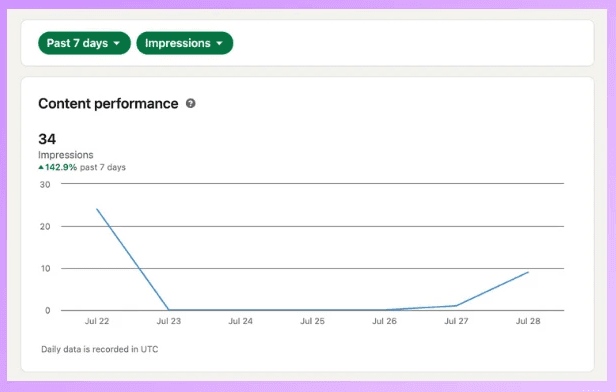
Impressions are numbers that tells the story about visibility. The more impressions you get, the more eyeballs on your content.
This visibility can lead to connections, job opportunities, collaborations, and a stronger professional network. For example, more impressions increase the likelihood that a recruiter or potential business partner sees your post.
LinkedIn's algorithm determines who sees your content. It considers factors like engagement, relevance, and connections. Understanding this algorithm can help you tailor your content to reach more people. When your post gains traction through likes, comments, and shares, LinkedIn promotes it to a broader audience, further increasing your impressions.
What Are “Good” Impressions ?
First things first. A good number of LinkedIn impressions depends on your profile and how you share content. The answer can be different for everyone, since impressions are shaped by:
1. Network Size:
If you have a bigger, more connected network, you’ll likely see more impressions. People with thousands of connections or followers usually get far more impressions than those with smaller networks.
2. Industry:
Certain fields like technology, marketing, or business, tend to receive more engagement on LinkedIn, which can lead to higher impression numbers. If you’re in a niche or specialized area, you might see fewer impressions, but the interactions you get could be more meaningful.
3. Content Type:
Posts with videos, images, or other rich media usually get more impressions than plain text. Sharing thought leadership or timely industry insights can also help your posts reach more people.
Why are LinkedIn Impressions Important
Because impressions are the metric you want to check to understand how your content is reaching.
When your post gets more impressions, it means your content is being showed to a broader audience; which can lead you to more visibility, followers, and potential clients.
It also helps you track the effectiveness of your content strategy.
If certain content shows an increase in impressions, keep at it! It's resonating with your audience.
1. Creating High-Quality Content
High-quality content is the cornerstone of boosting LinkedIn impressions.
Crafting engaging and valuable content involves understanding your audience's needs and interests. Ensure your posts are relevant and original, providing insights, tips, or information that adds value.
I mean, just look at who you follow on LinkedIn or even on other social medias.
Indeed, some of them may be fun and all, but we know that a lot of them are creators that provide value. Even passion!
When you take a quick look on the top creators on LinkedIn, like Alex Chu for example, we can directly tell that creating high-quality content is key. Right?! We can not say that all of his followers are tech-fans. He built, thanks to his incredible content based on pedagogy and amazing visuals, a huge community that doesn’t necessary understand all of his posts.
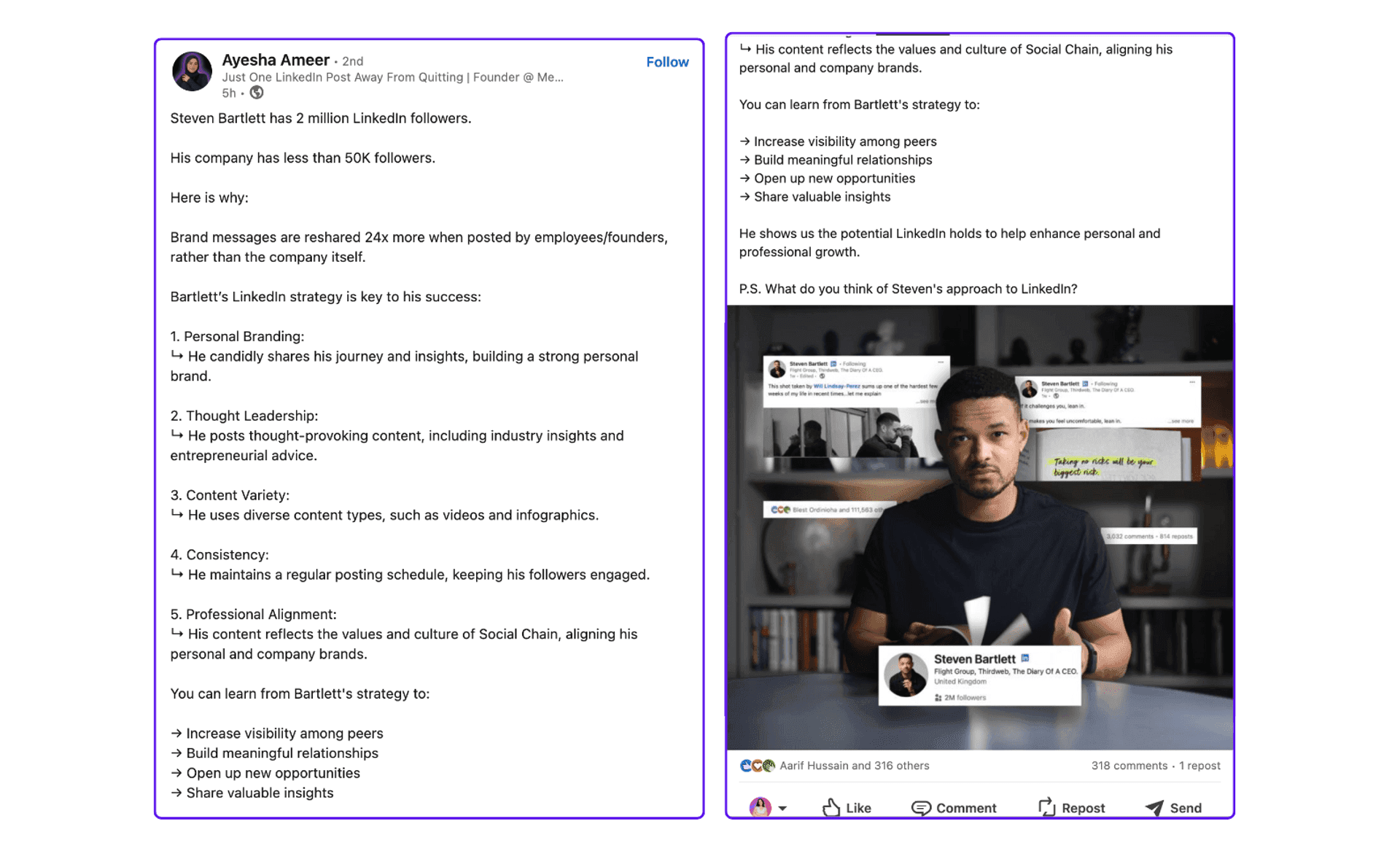
Tips for Crafting Engaging Content:
Know Your Audience
It sounds silly, but a lot of creators forget it. You really have to tailor your content to address your target audience's specific interests and challenges.
For example, if your audience consists of marketing professionals, share the latest trends, case studies, and actionable marketing strategies.
Be Authentic
It’s cliché. We know. However, content that is not coming from you, from your passion, from your world, will flop. You need to stay true to your values. True to yourself, because people can sense it if you are not. And you will miss a lot of good opportunities if your audience doesn’t know how to picture you. Doesn’t know you.
Add Value
There's no better way to make an impression. You need to provide actionable tips, industry insights, and useful information that your audience can benefit from. You already have a few creators that you follow closely that bring you value. Observe how they do it.
For instance, a post outlining five ways to boost productivity in remote teams can provide immediate value.
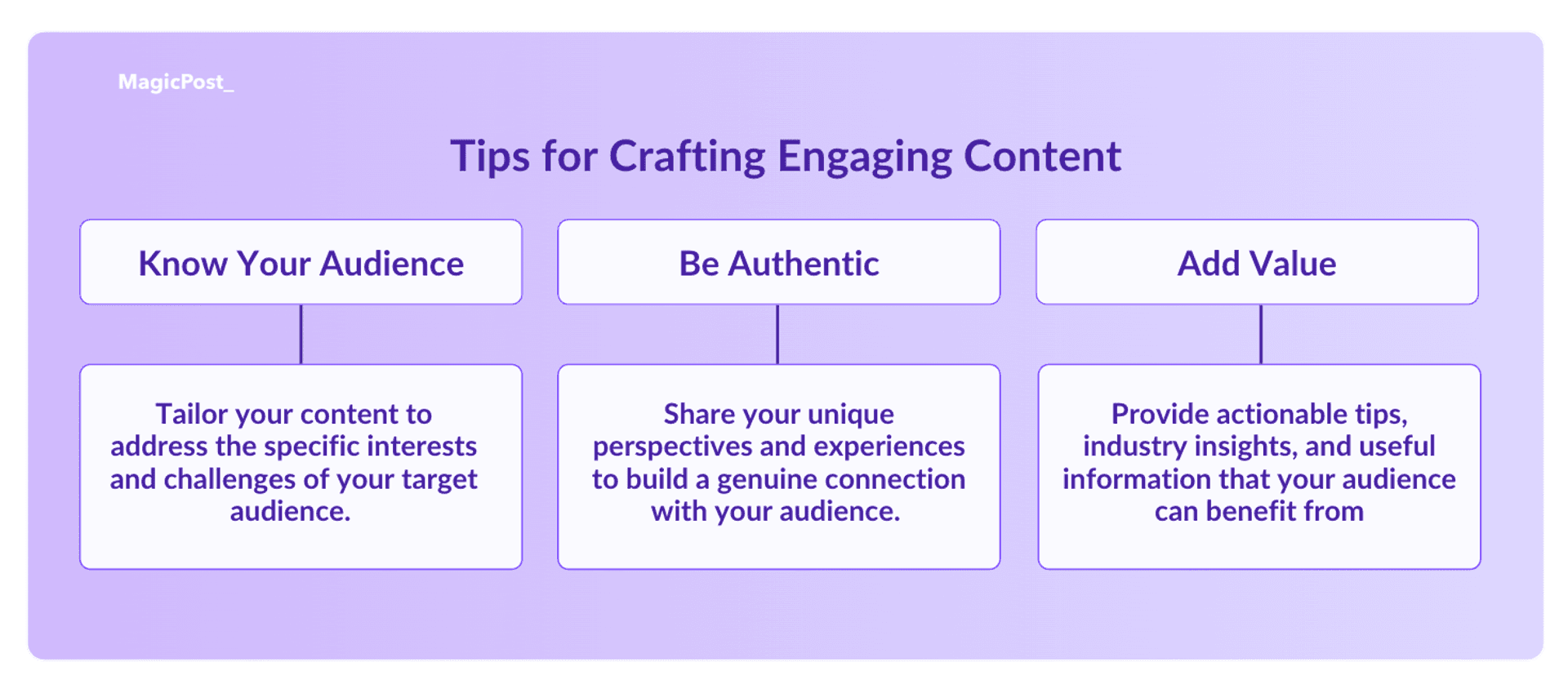
2. Use Visuals Effectively
You know the famous saying: “A picture is worth a thousand words.” Well, on LinkedIn, a great visual can be worth a thousand impressions!
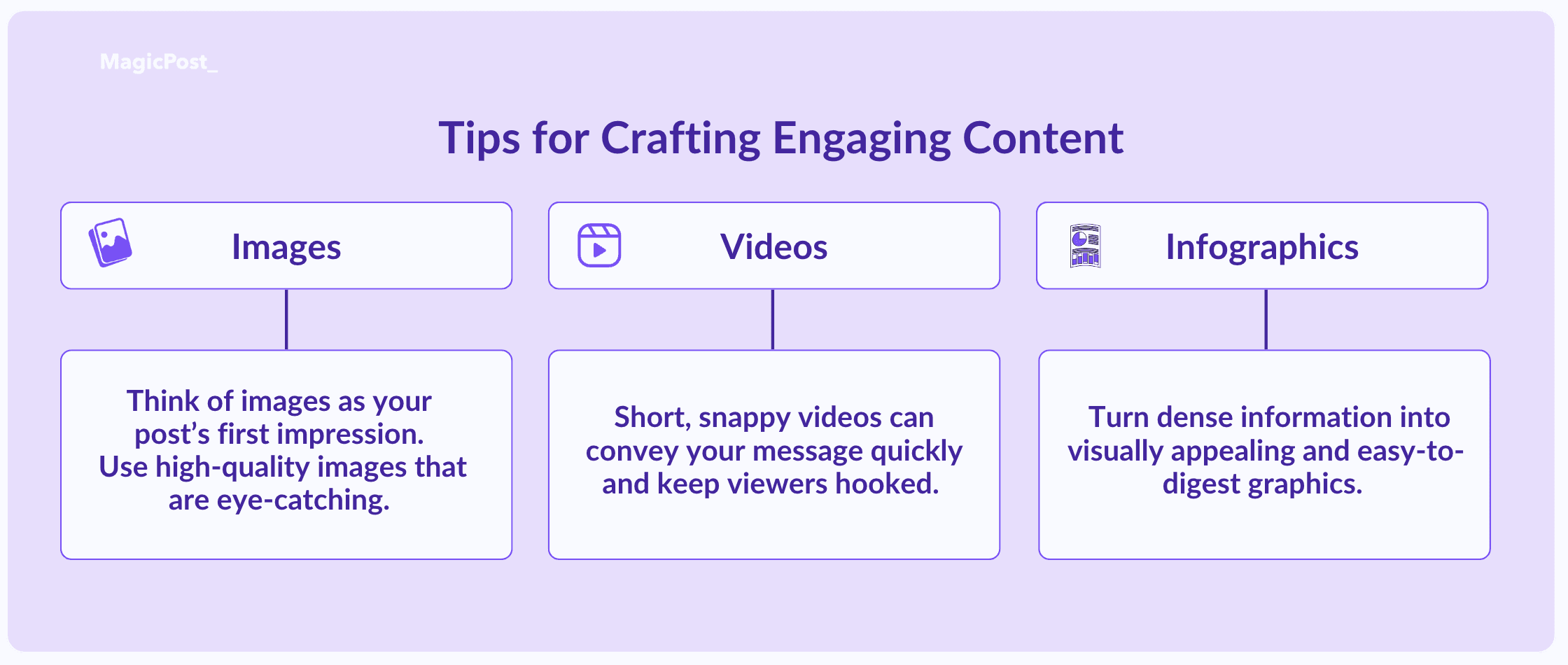
Visual content is a powerhouse for grabbing attention and driving engagement. Let’s dive into how you can use images, videos, and infographics to make your LinkedIn posts pop and draw in those valuable impressions.
Tips for Incorporating Visuals:
Images
Think of images as your post’s first impression. Use high-quality images that are relevant and eye-catching. Instead of generic stock photos, try to use original photos or custom graphics that reflect your brand’s personality.
For example, if you’re posting about a successful project, include behind-the-scenes photos or team pictures to give it a personal touch. And don’t forget to keep it professional yet relatable – a touch of authenticity goes a long way!
Videos
“TikToks”, “Reals”, “Shorts”: Videos are the rock stars of social media, and LinkedIn is no exception.
Short, snappy videos can convey your message quickly and keep viewers hooked. Aim for videos under two minutes, which is enough time to share valuable insights without losing your audience’s attention.
Make sure to add subtitles because many LinkedIn users scroll through their feeds with the sound off. Whether it’s a quick tutorial, a product demo, or a mini-interview, videos can make your content dynamic and engaging.
Infographics
Got complex data or a process that needs explaining? Infographics are your best friend!
They turn dense information into visually appealing and easy-to-digest graphics. Use infographics to share industry statistics, illustrate workflows, or break down step-by-step guides.
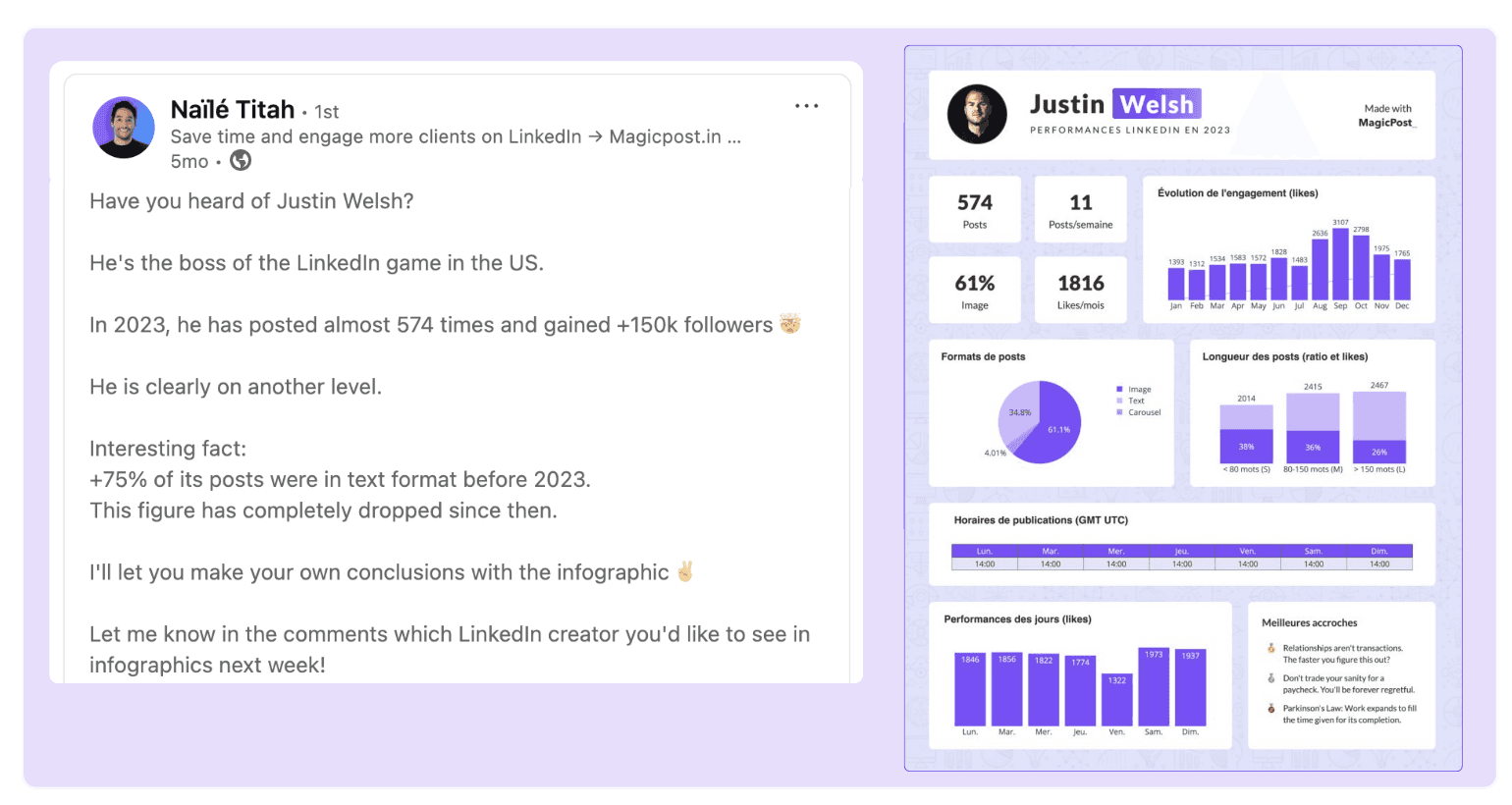
For instance, if you’re sharing market research findings, an infographic can highlight key data points in a colorful and engaging format. The visual appeal of infographics not only makes the information more accessible but also more shareable.
3. Craft Compelling Hooks
The first few lines of your post are crucial in grabbing your audience's attention. A compelling hook can entice users to read more and engage with your content. Stay sharp, grab a piece of paper and a pen.Tips
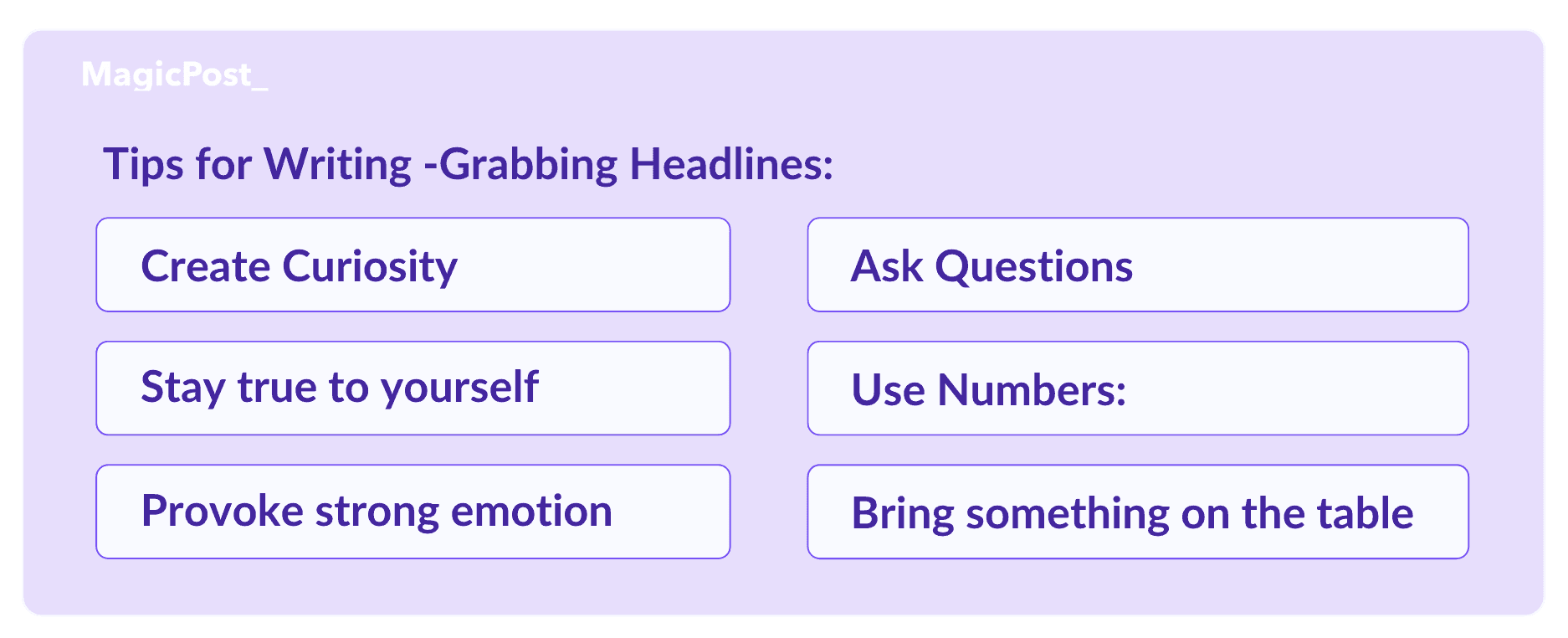
We're gonna give some good tips to attract your audience on your content and increase your impressions.
Tips for Writing Attention-Grabbing Headlines:
Create Curiosity
Craft headlines that spark curiosity and make readers want to learn more. An example could be, "The Secret LinkedIn Hack Only 10% of Professionals Know."
Stay true to yourself
We’ve already talked about this earlier. But you need to keep your authenticity. People will follow you for this.
Provoke strong emotion
Fear. Anger. Joy. We’re not going to talk about the movie Inside-Out here but you need to understand that people are attracted by strong emotions. Do not be afraid to shock your audience. Simply because people will relate to them.
“Bring something on the table”
You want people to hit this “read more” button right?! Add value to your content but most importantly to your hook. Convince your audience that they will not regret reading your post and not waste its time.
Ask Questions
Pose thought-provoking questions that encourage readers to think and engage. For example, "Are you leveraging LinkedIn's latest features to boost your brand?".
Use Numbers
Some numbers, in our occidental world, got a lot of meanings. Even some has super-powers! Numbers reassures. 3 / 5 / 7 / 10 / 12 for exemples or 50 / 100, you can picture some headlines already, from LinkedIn posts to YouTube video titles or even newspaper headlines.
Use these different types of hooks below following the audience you target :
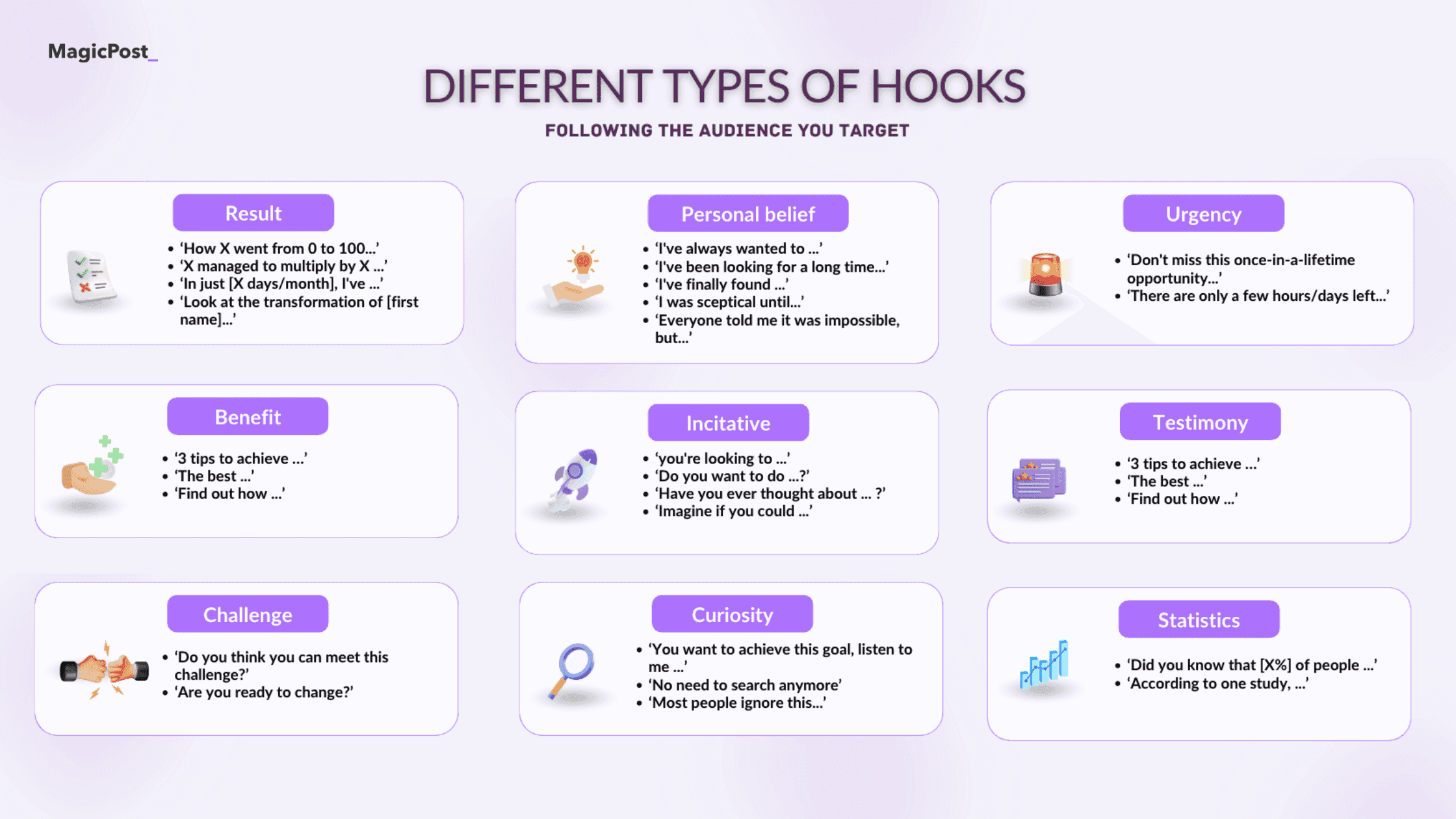
4. Engage with Your Network
Engaging with your LinkedIn network is like mingling at a lively professional mixer, every interaction is an opportunity to build relationships, showcase your expertise, and increase your visibility.
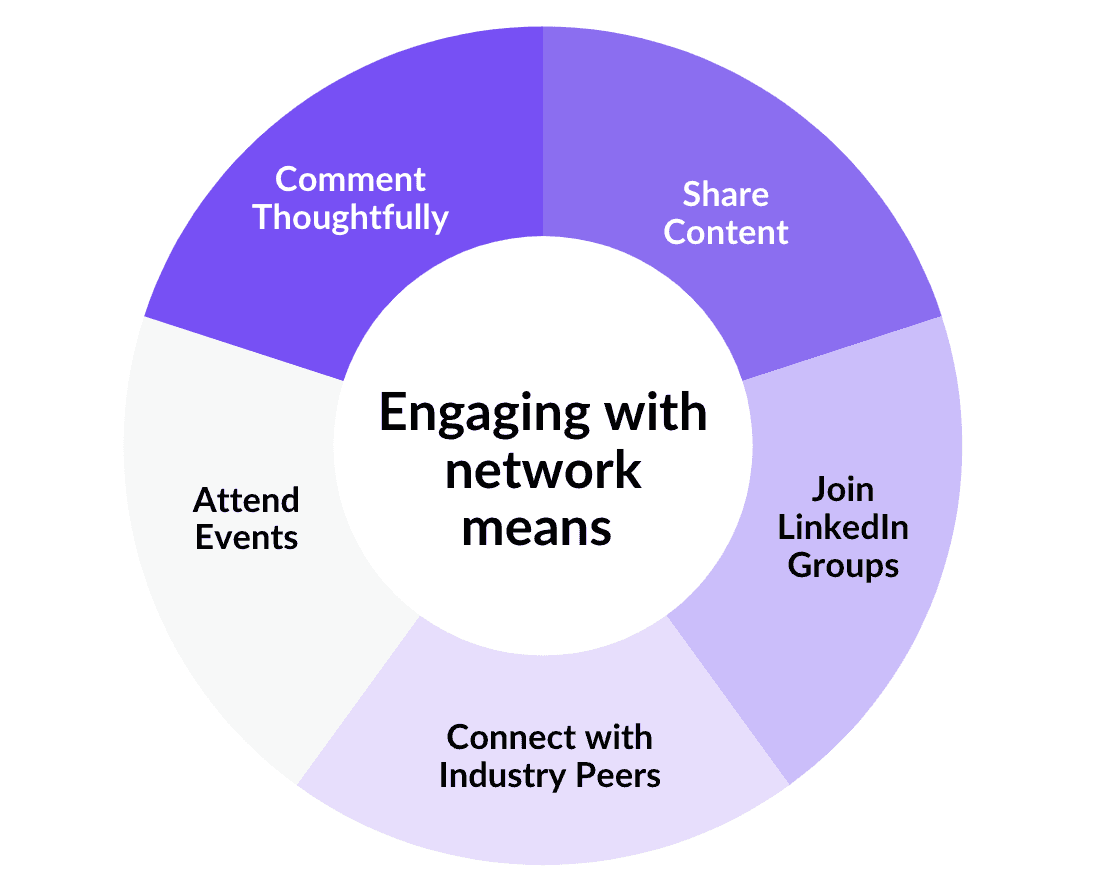
The more actively you participate, the more impressions you'll generate, leading to a more robust and engaged network.
Active Participation
Engaging with others' content is one of the most effective ways to boost your visibility on LinkedIn.
By leaving thoughtful comments and sharing relevant posts, you not only build relationships but also encourage reciprocation, where others will engage with your content in return. In other words, do not be shy.
Ways to Engage Actively:
Comment Thoughtfully
When you come across a post that resonates with you, don't just like it, leave a comment! Share meaningful insights or ask questions that add value to the conversation.
For instance, if a connection posts a detailed analysis on remote work productivity, you could share it with a comment like:
"Excellent breakdown! I’ve found that incorporating regular virtual team-building activities can significantly boost remote team morale. What strategies have worked for you?"
"Great insights! I’ve noticed that AI-driven analytics are also gaining traction. Has anyone here implemented AI tools in their marketing strategies?"
This not only demonstrates your active participation but also positions you as a thought leader.
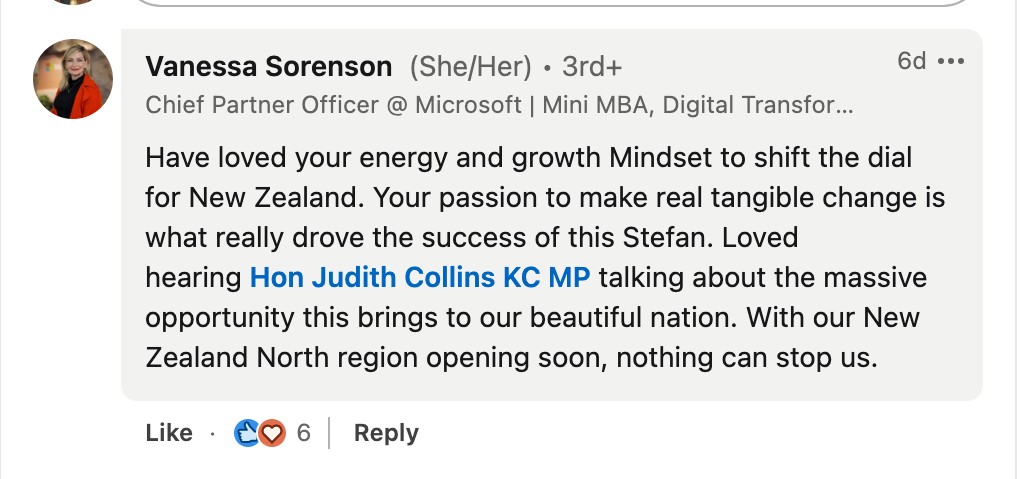
Build a Larger Network
Expanding your LinkedIn network is crucial for increasing your post impressions.
A larger network means your content reaches more people, leading to higher engagement and visibility. Think of it as casting a wider net—more connections mean more opportunities for your content to be seen and shared. Aim bigger!
Strategies for Expanding Your Network:
1. Connect with Industry Peers:
Reach out to professionals in your industry to build mutually beneficial connections. Personalize your connection requests to explain why you want to connect.
Instead of a generic message, try something like:
"Hi [Name], I came across your profile and was impressed by your work in [specific field]. I’m looking to connect with industry experts to share insights and stay updated on the latest trends. Looking forward to connecting!"
This personalized approach increases the likelihood of your connection request being accepted.
2. Join LinkedIn Groups
Participate in groups relevant to your field to connect with like-minded individuals. Share your insights in group discussions and become an active member.
For example, if you’re a marketing professional, join groups focused on digital marketing, SEO, or content strategy. Regularly contribute to discussions, share useful resources, and ask thoughtful questions.
This positions you as an engaged and knowledgeable member of the community.
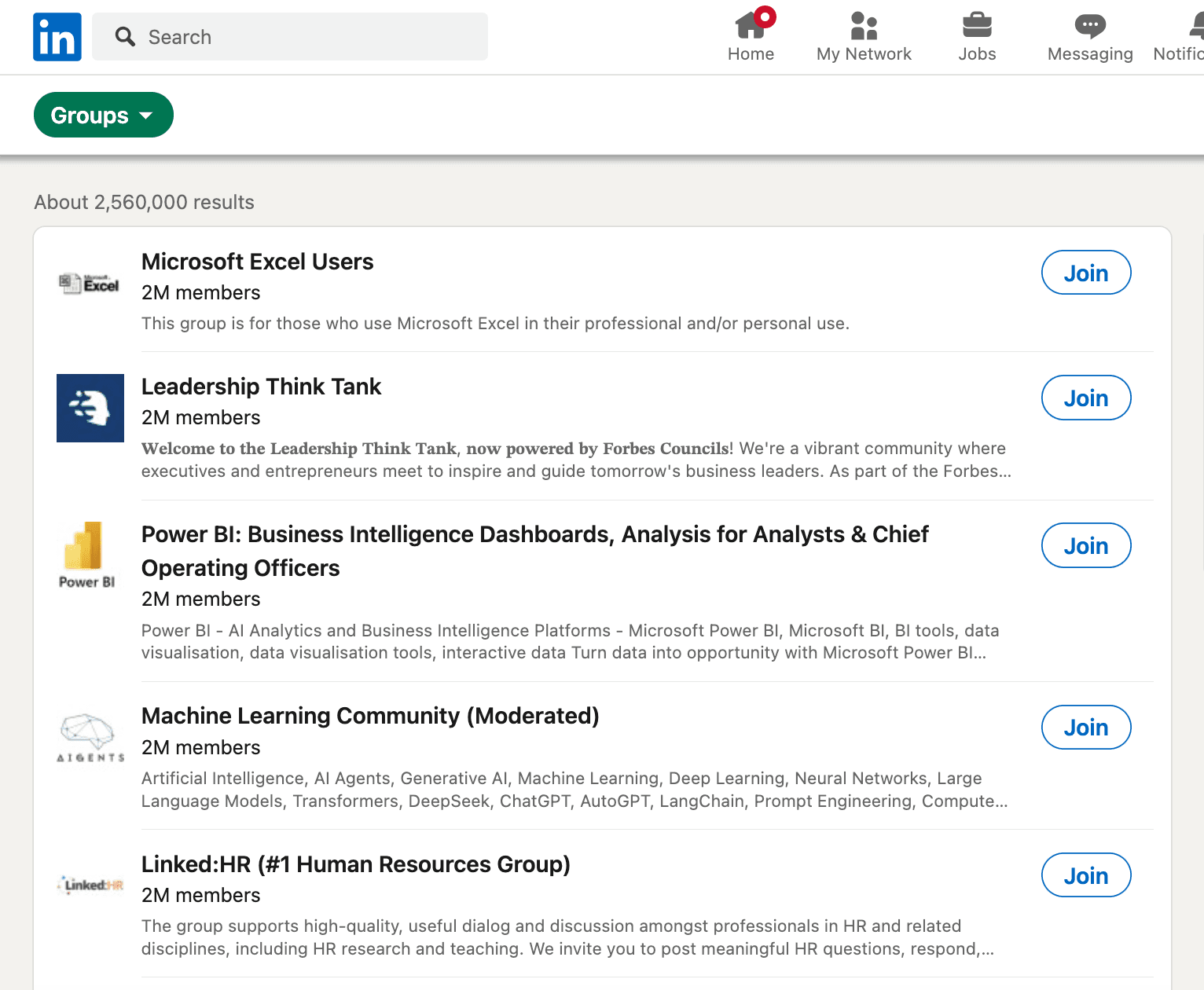
3. Attend Events
Engage with connections you meet at industry events and webinars. Follow up with a personalized message to continue the conversation. After attending a virtual conference or webinar, send connection requests to fellow attendees with a note like:
"Hi [Name], it was great connecting with you during [Event]. I enjoyed our discussion about [specific topic] and would love to stay in touch."
This not only strengthens your network but also keeps the conversation going beyond the event.
5. Timing and Frequency of Posts
Timing and frequency play a pivotal role in maximizing your LinkedIn post visibility and impressions.
By strategically timing your posts and maintaining a consistent schedule, you can ensure that your content reaches a wider audience and stays top-of-mind.
Tips on the Best Times to Post
Posting at the right times can significantly enhance your content’s reach. It’s essential to understand when your audience is most active on LinkedIn to ensure your posts are seen by as many people as possible. Seems to easy? Here is the consensus on the optimal posting times:
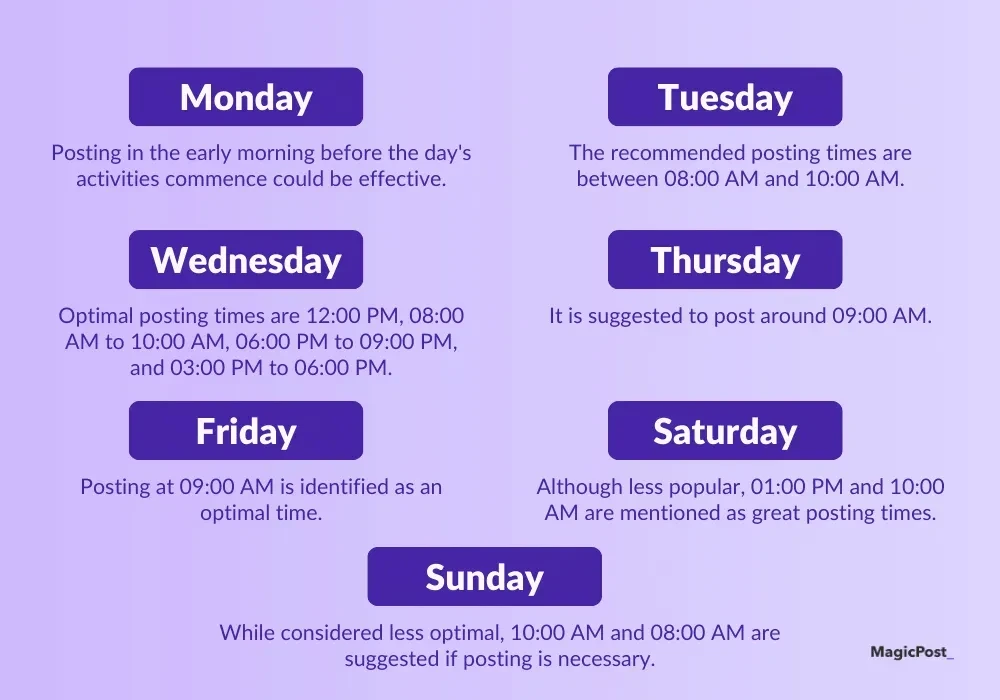
Weekdays:
Early mornings, lunchtime, and late afternoons are generally the best times to post. For instance, posting around 8-10 AM, 12 PM, and 5-6 PM can increase visibility.
These times align with when professionals are likely checking LinkedIn before work, during lunch breaks, and after work hours.
For example, a post about career tips at 8:30 AM might catch the eye of users starting their day.
Weekends:
Depending on your audience, weekends can also be effective for reaching professionals who check LinkedIn during their downtime.
Experiment with different times, such as late morning or early afternoon, to see what works best for your audience.
For example, a motivational post at 11 AM on a Saturday could engage professionals who are casually browsing LinkedIn over coffee.
Understanding your specific audience’s behavior is crucial. Utilize LinkedIn Analytics to track when your posts receive the most engagement and adjust your posting schedule accordingly.
6. Stay Consistent by Scheduling Your Posts
Consistency is key to maintaining and increasing your impressions over time.
Regular posting keeps your content fresh in your audience's mind and encourages ongoing engagement.
It’s normal right?! More people sees your face, more chances you have that they check your work. And the LinkedIn algorithme kinda like it as well!
Tools and Strategies for Scheduling Posts:
Use Scheduling Tools
Platforms like Hootsuite, Buffer, or LinkedIn’s own scheduling feature can help you plan and schedule posts in advance. This ensures you maintain a steady flow of content without having to post manually each time.
For instance, if you’re planning a series on industry trends, you can schedule posts for the entire week or month in one go. This not only saves time but also helps in maintaining consistency.
Create a Content Calendar
Plan your content ahead of time to ensure a consistent posting schedule. A content calendar can help you organize your topics, align with upcoming events, and ensure a balanced mix of content types.
For example, you might plan a mix of industry news, personal insights, and interactive posts (like polls) throughout the month. This variety keeps your content engaging and relevant to your audience.
7. Analyze and Adapt Your Strategies
Analyzing and adapting your LinkedIn strategy is crucial to staying ahead and keeping your content fresh and engaging.
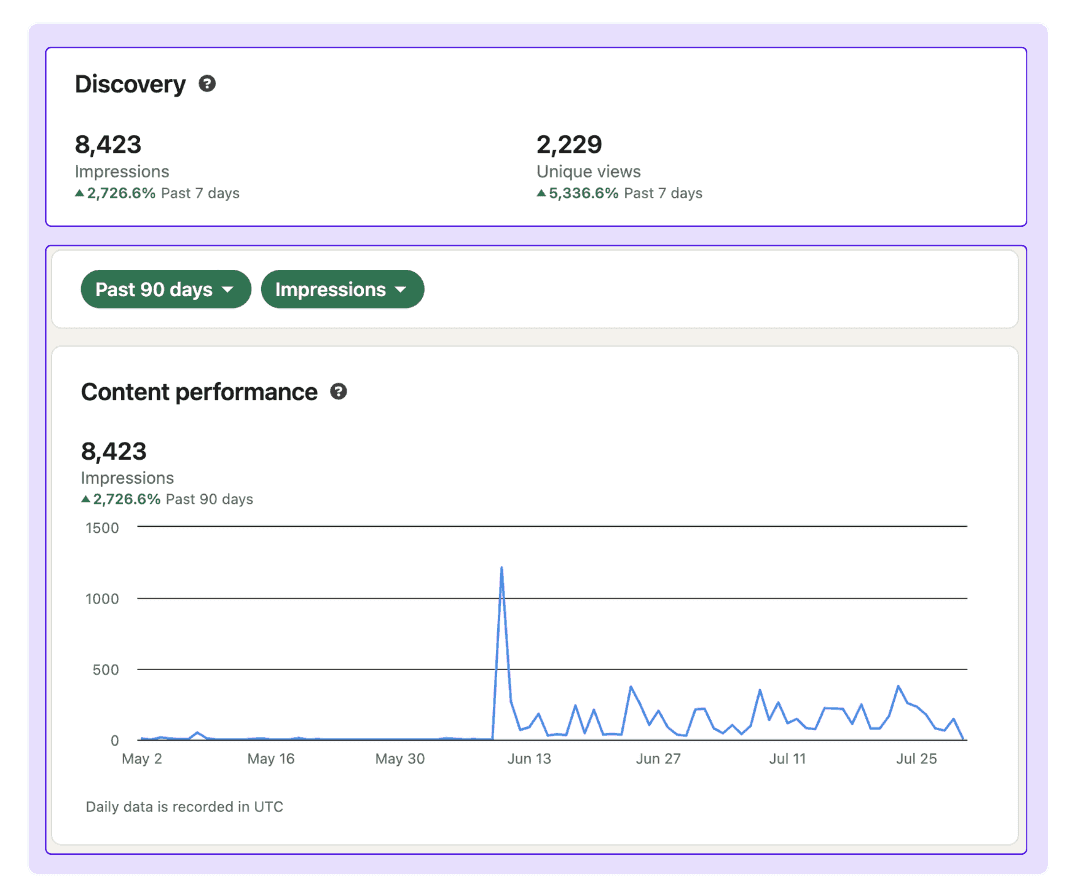
By leveraging LinkedIn Analytics, you can make data-driven decisions to continuously improve your performance. In other words, trust the numbers and work for it!
Tips on Monitoring Performance with LinkedIn Analytics
LinkedIn Analytics provides a gold mine of insights into how your content performs.
Regularly monitoring these metrics helps you understand what resonates with your audience and what needs tweaking.
Here are some key Metrics to Track:
Impressions
The number of times your post is displayed on users' feeds. This metric indicates your content’s reach. For example, if a post about industry trends garners 5,000 impressions, it means your topic is fire!
Engagement
Likes, comments, shares, and clicks on your posts. Engagement metrics reveal how your audience interacts with your content. For instance, a post with high likes and comments but low shares might be engaging but not compelling enough to share.
Follower Growth
The increase in followers over time. This metric shows how well your content attracts new followers. A steady increase in followers suggests your content is valuable and resonates with new viewers.
Click-Through Rate (CTR)
This metric shows how many people clicked on a link in your post compared to the number of impressions. A higher CTR indicates that your content is not only being seen but is compelling enough to drive action.
To Sum Up
It's good to have many impressions, but it's especially valuable to create useful, engaging content. So try to focus on the stats only 20% of the time to improve, and enjoy the process 80% of the time.
Have Fun And Impressions Will Follow
Tired of spending hours writing your next LinkedIn post? Try MagicPost!
No credit card required
Enjoy your free trial.
